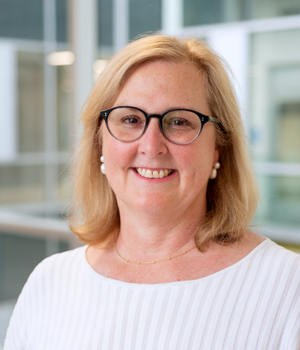Search Website
QUICK LINKS:
The urgency, opportunity and optimism of aging in Canada

By Communications
Canada is aging – and fast. By 2030, adults 65 and older will make up nearly a quarter of the population – a demographic shift that is reshaping health care.
Few see this shift more clearly than Dr. Sheri-Lynn Kane, chair/chief of the Division of Geriatric Medicine at Schulich Medicine & Dentistry and medical director of the R egional Geriatric Program of Southwestern Ontario based at St. Joseph’s Health Care London. A geriatrician, medical educator and advocate for older adults, she supports a more inclusive approach to healthy aging.
As the Division marks its 50th anniversary in 2025 , we spoke with Kane about geriatric medicine in Canada – the challenges, the opportunities, and why we all have a stake in rethinking how we age.

As Canada’s population ages, how is our health care system responding? What is the current landscape for senior care?
It’s complex — we know demand is rising, but the health care system still needs to adapt.
Access to care is a big concern. We hear a lot about challenges accessing primary care, but for older adults, especially those over 85, it’s also about access to specialty care. Timely access is a real issue, and it can be compounded by transitions in care — whether from primary care to specialist, hospital to home, or between members of the care team. The richness of information, especially from those doing hands-on care like personal support workers, can get lost. We need a better way to coordinate care, to bring together all the care a person receives, to meet their unique needs.
Another consideration is creating age-friendly and inclusive health care spaces. How can we better train people who work with older adults experiencing frailty? How can we design accessible spaces that account for hearing, vision or mobility challenges? If we design our health care system with older adults in mind, it leads to better care for everyone.
Geriatricians have been called an “endangered species of physician.” What is the state of geriatric medicine in Canada?
That phrase isn’t wrong. We’re not keeping pace with the needs of an aging population, and we won’t be able to train enough specialists — that’s the reality. So, we need to think differently about care delivery. That includes models of care and systems-level solutions, but also foundational training for every physician, regardless of specialty.
Most patients in any clinic or hospital will be older adults. You can’t avoid it — nor should you want to. No matter the specialty you end up practicing, the majority of your patients will be older adults, so we need to ensure future doctors have the foundational knowledge and skills.
BY THE NUMBERS: AGING IN CANADA
- 1 in 5 Canadians is over age 65.
Seniors (65+) are projected to reach 23% of the population by 2030 .
Source: Statistics Canada, 2024
- Fastest-growing age group: 85 and older
This segment is expected to triple by 2050.
Source: Government of Canada, 2021 census data
- Canada is short thousands of geriatric specialists.
A 2022 study projected a need for 3,000+ geriatricians by 2030. Fewer than 400 are practicing in Canada today.
Source: Canadian Geriatrics Journal
- Caregiver burden is rising.
More than 8 million Canadians are unpaid caregivers — with nearly half supporting aging parents or spouses. Many report high levels of stress and burnout.
Source: Statistics Canada, 2022
What are the misconceptions about caring for older adults that you encounter most often?
The idea that everything is just because of age. I hear it from patients who’ve been told “what do you expect at your age?” And I say, “but you were 84 six months ago — were you having this issue then?” If the answer is no, then it’s not just age. It’s something treatable. We need to push back against this kind of ageism.
Another misconception is that the work must be depressing — it’s quite the opposite! I fell in love with this field because when you help an older adult with what matters most to them, the impact is incredibly rewarding. Every geriatrician I know feels the same.
How can we better support healthy aging and the care of older Canadians?
It starts with community. People want to age at home, and with the right support — including day programs, accessible transportation, and home care — they can. But we’ve traditionally focused funding and attention on hospitals. That needs to change.
“Aging is in all of our futures. Let’s make the system one we’d be proud to grow old in.”
We also need better training across all levels of care, more interdisciplinary team models, and greater recognition of the unique needs of older adults — like hearing support or mobility aids. These aren’t luxuries; they’re essentials.
In geriatrics, we talk about the five M’s framework – mind, mobility, medication, multicomplexity and what matters most (to patients). Having care teams that understand and work collectively to address these areas is vital in improving outcomes and quality of life for older adults.
What gives you hope?
People are finally listening. For years, geriatricians have been sounding the alarm, and now, with the demographic shift, there’s widespread recognition that we need to do things differently. Surgeons and oncologists are reaching out to collaborate. Medical learners are more aware. Geriatrics is having its renaissance, and that’s something to be excited about.
If you could leave people with one take-home message, what would it be?
Don’t reduce older adults to a set of challenges. Yes, about a quarter experience frailty — but the vast majority are active, vital contributors to our families and communities. They volunteer, they work, they care for others.
We need to stop talking about a “silver tsunami” and start recognizing the strengths of this population. Aging is in all of our futures. Let’s make the system one we’d be proud to grow old in.
50 YEARS OF EXCELLENCE IN GERIATRICS
Established in 1975 by Dr. Ronald Cape, the Division of Geriatric Medicine at Schulich Medicine & Dentistry was one of Canada’s first academic geriatric programs. Over five decades, the Division has grown to be a leader in clinical care, research and education.
“As we celebrate the 50th anniversary, we reflect on this journey shaped by researchers, clinicians, learners, educators and staff – past and present – committed to improving care of older patients through collaboration, compassion, accountability, respect and excellence,” said Dr. Wael Haddara, interim chair/chief of the Department of Medicine.